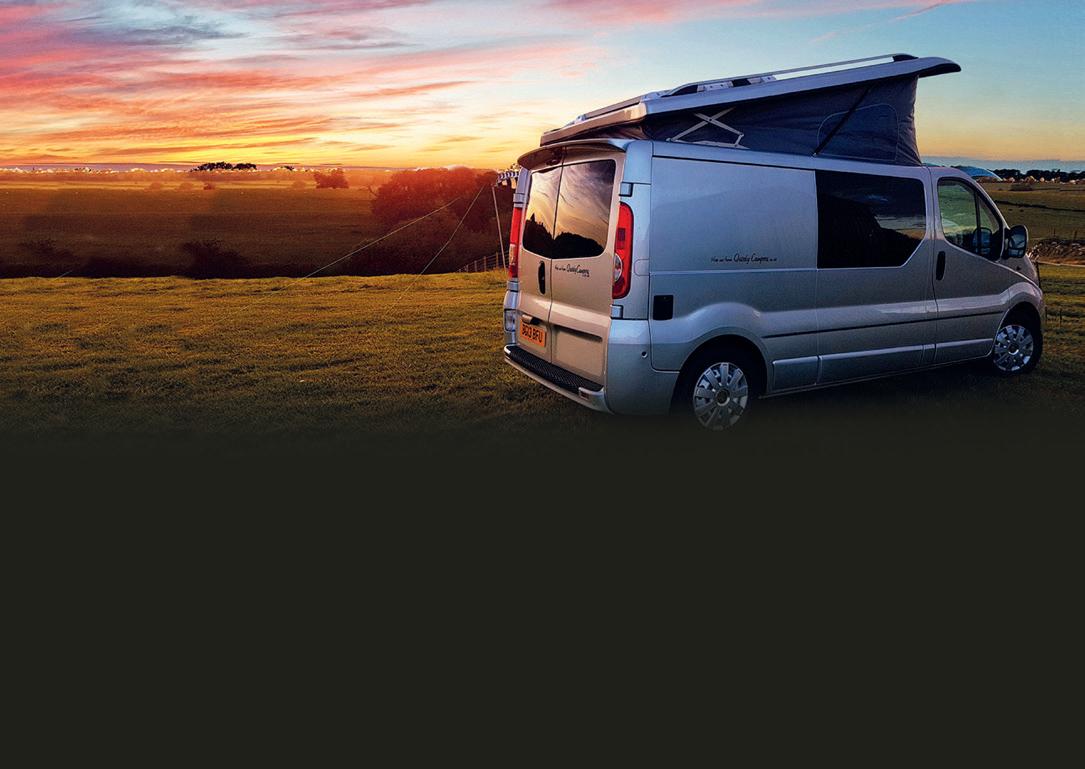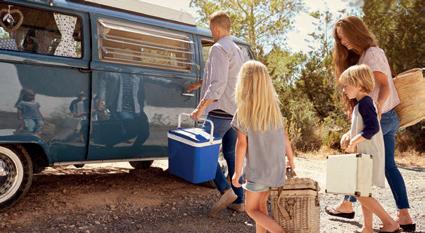
4 minute read
Campervan Hire On The Road
Campervan hire
Part two: Taking your campervan on the road
Advertisement
PART ONE of our guide to
hiring a campervan provided practical tips on hiring a van for your perfect holiday. Now you have a better idea of what to expect, here’s how you can make the most of it...
Pitching up
Embarking on your road trip
The temptation may be to cover a lot of miles and pack a lot in (literally!). But remember that once you’ve collected your hired campervan the enjoyment is in the journey, not the destination. So try to take it more s-l-o-w-l-y than you would in a car, particularly if you’ve hired a vintage camper or motorhome. Relax, take it easy and enjoy the novelty of the ride. The driving experience is different for starters. While modern campervans will feel similar to a (heavy) car, vintage campers are a different story altogether and you’ll need to treat them gently. The lack of power steering and engine power will often dictate your pace of driving anyway, while you’ll have to use side mirrors much more frequently and will need to get used to parking! A final tip is to park well away from others and also seek out car parks with larger spaces for motorhomes. So you’ve picked up your camper... but where to camp? If you’re holidaying in a quieter month then you can afford to be spontaneous and just pitch up, but at peak times or popular places it’s advisable to book ahead to avoid turning up after a long drive to find the site’s already full. For those used to camping under canvas, camper vans are much quicker and easier to set up: just make sure you select a flat pitch (avoiding wet or boggy grass) and choose one with an electric hook-up only if you intend to plug in 240v appliances such as kettles and heaters. Just raise the roof, wind out the awning and put the kettle on!
Do I need to stay on a campsite?
It’s a fairly common question for first time campers. While in theory the self-sufficiency of a campervan means you could ‘wild camp’, in practice it’s advisable to stay at campsites for two main reasons. First, choosing a spot just off a road will lack essentials such as electricity, toilets, hot showers and washing-up facilities, and may potentially be unsafe. Secondly, so-called wild camping is difficult and actually illegal in England and Wales. Scotland’s Outdoor Access Code is widely misinterpreted. In Scotland too, wild camping in campervans is technically prohibited. However, on beach and countryside car parks informal camping is sometimes tolerated across the UK as long as you use common sense. This means obeying signs and bylaws, parking away from others, considering the cumulative impact of wild camping on local habitats, taking all waste away with you and never staying more than a night or two.

Meals on wheels

Cooking is great fun in campervans. But with only two rings (plus a fridge and water on tap) you’ll need to be inventive with your meal planning! Quick-cooking meals involving pasta, couscous and chilli are staples, matched with ingredients such as pesto, chorizo, fresh seafood and herbs. When it comes to smelly foods such as fry-ups and kippers, our advice is to cook these outside on a barbeque or small stove! Sleeping arrangements
While younger children can go to bed at their normal time in a larger motorhome or campervan with a pop-top roof (given separate sleeping areas), many families may find that it’s easiest just to share the same bedtime. You are on holiday after all! At night, pack the family off to the wash block en masse and get some much-needed space to make up the beds. In the morning, the earliest riser gets washed first, then packs up the beds and makes a start on breakfast. Similarly, it pays to think ahead about your belongings and pack wisely. Leave those hard suitcases at home and take soft bags (packing cubes are great for compressing clothes). Give everyone their own storage space and find a designated place for everything to save arguments. Inevitably, though, you’ll want to take along bikes, dogs, kayaks and other paraphernalia. Your camper van hire company should be able to provide bike racks and roof bars at an additional cost, and a driveaway awning is well worth considering if you plan to be on a campsite for more than a couple of nights. Essential hints and tips
l Pace yourselves: choose an itinerary that allows for meandering - particularly if you’re hiring a vintage camper. l Take it easy driving on the first day. l Book campsites in advance, especially if you’re travelling at peak times. l Plan a few ‘staple’ meals before you leave - and take small containers of those essentials (such as spices, olive oil and parmesan) from home. l Travel light: leave suitcases at home and take smaller, soft bags. Be aware that storage can sometimes be limited.






